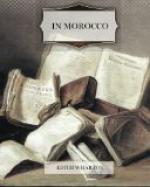It is a mistake to suppose that hatred of the Christian has always existed among the North African Moslems. The earlier dynasties, and especially the great Almohad Sultans, were on friendly terms with the Catholic powers of Europe, and in the thirteenth century a treaty assured to Christians in Africa full religious liberty, excepting only the right to preach their doctrine in public places. There was a Catholic diocese at Fez, and afterward at Marrakech under Gregory IX, and there is a letter of the Pope thanking the “Miromilan” (the Emir El Moumenin) for his kindness to the Bishop and the friars living in his dominions. Another Bishop was recommended by Innocent IV to the Sultan of Morocco; the Pope even asked that certain strongholds should be assigned to the Christians in Morocco as places of refuge in times of disturbance. But the best proof of the friendly relations between Christians and infidels is the fact that the Christian armies which helped the Sultans of Morocco to defeat Spain and subjugate Algeria and Tunisia were not composed of “renegadoes” or captives, as is generally supposed, but of Christian mercenaries, French and English, led by knights and nobles, and fighting for the Sultan of Morocco exactly as they would have fought for the Duke of Burgundy, the Count of Flanders, or any other Prince who offered high pay and held out the hope of rich spoils. Any one who has read Villehardouin and Joinville will own that there is not much to choose between the motives animating these noble freebooters and those which caused the Crusaders to loot Constantinople “on the way” to the Holy Sepulchre. War in those days was regarded as a lucrative and legitimate form of business, exactly as it was when the earlier heroes started out to take the rich robber-town of Troy.
The Berbers have never been religious fanatics, and the Vicomte de Foucauld, when he made his great journey of exploration in the Atlas in 1883, remarked that antagonism to the foreigner was always due to the fear of military espionage and never to religious motives. This equally applies to the Berbers of the sixteenth century, when the Holy War against Catholic Spain and Portugal was preached. The real cause of the sudden deadly hatred of the foreigner was twofold. The Spaniards were detested because of the ferocious cruelty with which they had driven the Moors from Spain under Ferdinand and Isabella, and the Portuguese because of the arrogance and brutality of their military colonists in the fortified trading stations of the west coast. And both were feared as possible conquerors and overlords.
There was a third incentive also: the Moroccans, dealing in black slaves for the European market, had discovered the value of white slaves in Moslem markets. The Sultan had his fleet, and each coast-town its powerful pirate vessels, and from pirate-nests like Sale and Tangier the raiders continued, till well on into the first half of the nineteenth century, to seize European ships and carry their passengers to the slave-markets of Fez and Marrakech.[A] The miseries endured by these captives, and so poignantly described in John Windus’s travels, and in the “Naufrage du Brick Sophie” by Charles Cochelet,[B] show how savage the feeling against the foreigner had become.




